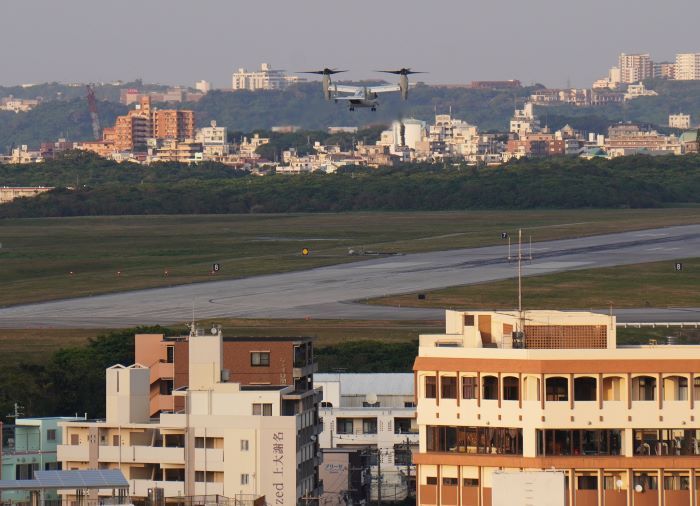Japan ordered to pay 1.3 billion yen to residents around MCAS Futenma in second lawsuit

A Marine Corps MV-22 Osprey flying in the sky over a residential district and coming in to land at Futenma Air Station at 553 p.m. on March 10 in Ginowan City (photograph by John Matsumoto)
March 11, 2022 Ryukyu Shimpo
Ryota Shimabukuro
On March 10, the Okinawa branch of the Naha District Court handed down its decision in the “second Futenma lawsuit”, in which 3,193 residents of the area surrounding Marine Corps Air Station (MCAS) Futenma claim to have experienced noise damage from the air station, and are requesting damages from the central government. Presiding Judge Kenta Adachi awarded these damages, and ordered the central government to pay 150 yen per day to residents of areas experiencing a Weighted Equivalent Continuous Perceived Noise Level (or W value) of 75 or more, and 300 yen per day to residents of areas experiencing a W value of 80 or more. The amount of compensation per person comes to the same level as from the first such lawsuit. The total amount of damages awarded comes to 1,342,740,000 yen.
The decision included the statement that the use of Futenma Air Station necessarily has a public nature and needs to serve public interest. However, the decision also contained mention, as concerns the choice to award damages, that the use of Futenma Air Station also “produces striking injustice in relation to the general public.” Furthermore, the decision also contains mention that even though Japan is making efforts such as pursuing soundproofing work, “it cannot be said that Japan is taking drastic measures” concerning the noise, and ordered that compensation be paid for psychological damage to residents, such as sleep disturbances and apprehension concerning accidents.
However, the plaintiffs’ claim for compensation for damage to health, anxiety about damage to health, and anxiety about the negative impact on their children and grandchildren was dismissed. The impact of low-frequency sounds was also not recognized. The amount of compensation is to be reduced by 10-30 percent depending on the implementation status of the soundproofing work.
Kenei Yamashiro, the head plaintiff, said, “The noise has gotten more intense since the suit was presented four years ago. We are not satisfied with the decision, and are considering an appeal.”
The Okinawa Defense Bureau, having been ordered to pay a portion of the compensation, issued the comment that, “We accept that we did not gain the court’s understanding. We will give careful consideration to our handling [of these matters] moving forward.”
(English translation by T&CT and Erin Jones)
Previous Article:Azaleas are in full bloom at Higashi Azalea Eco Park, a colorful sign announcing the coming of spring
Next Article:Second-generation Okinawan living in America wins drawing contest for her work “Okinawa of the World”
[Similar Articles]
- Japanese government ordered to pay 754 million yen compensation for Futenma noise pollution
- Futenma noise pollution lawsuit monetary award lowered over 30% in appeal ruling
- In third Kadena noise lawsuit, demand for flight injunction dismissed but 30.2 billion ordered in damages
- Law suit to halt noise from U.S. Marine Air Station Futenma filed by 3129 people
- In second Futenma noise lawsuit, court rejects demand for flight ban, claims of unconstitutionality
 Webcam(Kokusai Street)
Webcam(Kokusai Street)


